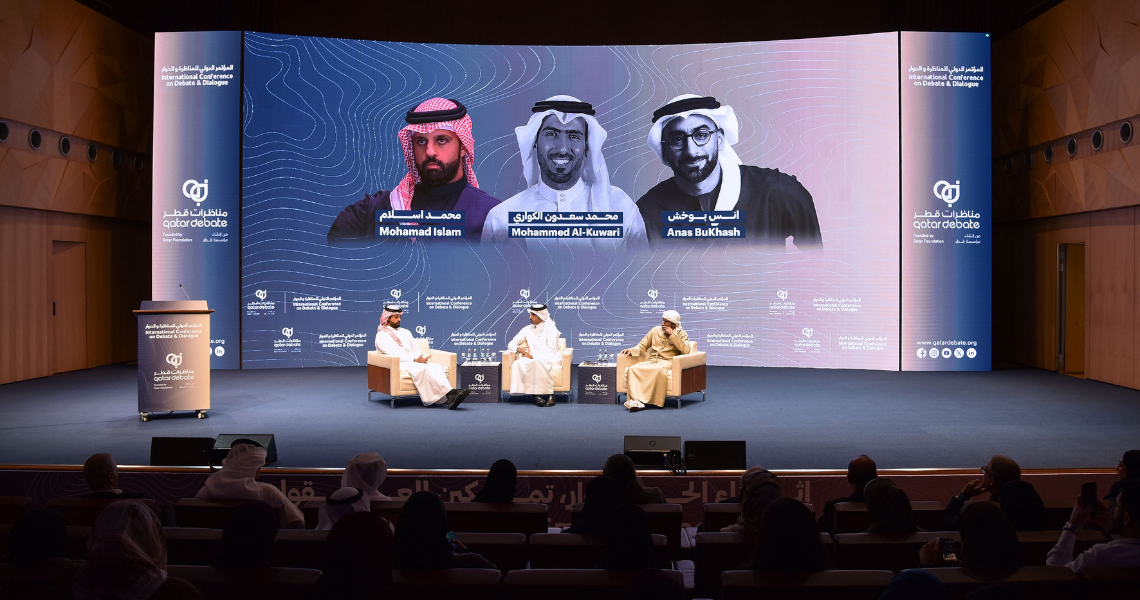QatarDebate’s Second International Debate and Dialogue Conference concludes with 1,200 participants
QatarDebate, founded by Qatar Foundation, concluded the second edition of the International Debate and Dialogue Conference on 20 May 2025. The two-day conference, attended by approximately 1,200 participants, brought together elite thinkers and academics from various disciplines from more than 36 countries. It also welcomed participants from prestigious universities around the world that adopt debate as part of their curricula and extracurricular activities, as well as representatives from leading civil society organizations engaged in community building, particularly among younger generations.
Reflecting on the success of the conference, Abdulrahman Al-Subaie, Director of Programs at QatarDebate, delivered a speech during the closing ceremony in which he emphasized that the conference "represents an important opportunity for researchers in the fields of dialogue, debate, and human communication to present research papers that reflect efforts across all sectors related to debate as a venerable art form and dialogue as a sublime form of communication."
Further underscoring the conference's significance, Al-Subaie noted that it aligns with the pioneering role of Qatar as one of the largest incubators of global dialogue and negotiation for peace, security, and justice. He added, “By the grace of God, Qatar's efforts have culminated in global achievements that have contributed to establishing peace and providing relief to those threatened in environments of danger and conflict."
He continued: "We live in an era where it is not enough to simply be right, but you must stand up for what is right. It is not enough to seek the truth, but also to desire it. It is not enough to be good, but you must also be a reformer." Al-Subaie concluded his speech by thanking Qatar Foundation and all the partners who support QatarDebate's mission, praising the significant impact the center has achieved regionally and globally.
As a highlight of the conference, a public dialogue session brought together Anas Bukhash, host of ABTalks, and Mohamed Islam, host of Mo Show, in a conversation moderated by Mohammad Saadon Al-Kuwari. The session focused on the topic: "Media Trailblazers: Multiple Approaches... Collective Goal."
In a dynamic exchange, the speakers discussed the diversity of their approaches and content, and their shared goals of breaking stereotypes, promoting transparency, and building trust in societies that still cling to traditional forms of expression. The audience also participated in an open dialogue session, during which questions were asked and opinions exchanged.
Moreover, the final day also featured the recording of a special podcast in collaboration with media partner Doha Plus, as part of efforts to document the conference outcomes and expand the scope of meaningful discussions.
The broader program of the second day included in-depth discussions through parallel sessions addressing intellectual and societal issues from multiple perspectives. These included the session “Informal Logic Journal,” which presented selected scholarly papers accompanied by expert commentaries; the session “Argumentation: Arab and Islamic Perspectives,” which explored the Arab heritage in this field; the session “The Impact of Debate on Enhancing Critical Thinking and Language Learning,” which highlighted the educational dimension of debate; and the session “Islamic Argumentation: Figures and Methods,” which reviewed pioneers of debate in Islamic heritage. A youth workshop titled “DEMOS Dialogue: Youth Voices” was also held.
Enriching the day’s discourse further, Professor Hammou Nakari, a scholar of philosophy and logic from Morocco, delivered the keynote address titled “The Logic of Disputation.” His remarks provided an overview of the Arab-Islamic intellectual legacy in debate and proposed a modern framework that integrates this heritage with contemporary theories of informal logic, argumentative reasoning, and critical thinking.
Furthermore, his lecture explored four fundamental pillars that distinguish the material of debate logic in the Arab-Islamic heritage: the authenticity of debate as a method; the correlation between the validity of reasoning and its freedom from objections; the legitimacy of the right to object as a basis for constructive dialogue; and the obligation to respond according to a set of specific logical and ethical conditions.
Evening sessions continued with discussions on contemporary topics. One session addressed the use of artificial intelligence in argumentation, examining its limitations and potential contributions to the art of debate. Another session, titled "Reimagining Education Through Debate: Insights and Case Studies," shared practical implementations of debate. Meanwhile, the session on "Argumentative Practice: Building Resilience, Agency, and Inclusive Dialogue" focused on strengthening dialogue skills while "Behind the Panel: Exploring the Practice and Philosophy of Debate Judging " offered insight into evaluative processes. The session "Analogical Arguments in Islamic Legal Theories and Contemporary Legal Reasoning: Abduction and Defeasibility " explored the intersection of traditional jurisprudence and modern logic.
Through these diverse sessions, the conference ultimately aimed to promote intellectual dialogue and the exchange of experiences among participants from around the world, with the goal of developing debate and argumentation mechanisms across various scientific and societal fields.



